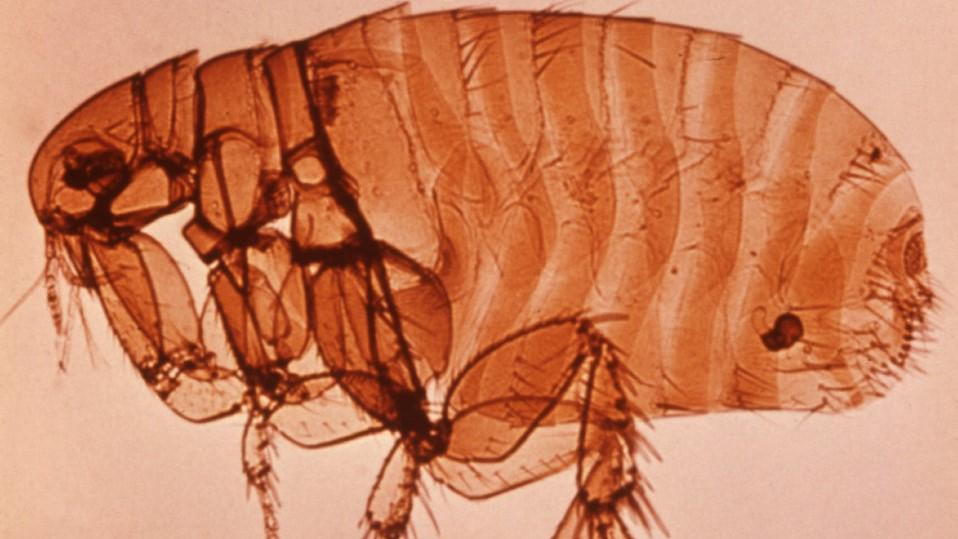How to Fight Fleas

- posted: Mar. 25, 2023
How to Fight Fleas
Warmer weather is on the way, and that means an increased chance of your pet coming in contact with fleas. To tell the truth, fleas can be a problem any time of year. Let’s learn more about these tiny nuisances and how to protect your pet from flea infestation.
Fleas are insects and parasites that feed on blood. The most common flea infesting our companion animals is the cat flea, Ctenocephalides felis. Fleas can infect cats, dogs, rabbits, ferrets, rodents, and other mammals. Adult fleas spend their time living on and feeding on the pet’s blood. Females lay eggs which fall off of the pet where they stay in then environment on furniture, bedding, carpet, etc. Eggs hatch into larvae within 2 weeks, though flea eggs may lay dormant for several months if conditions are not optimum for hatching. An adult flea can lay 40 eggs per day and an adult flea lives an average of 100 days—that’s up to 4,000 eggs from one flea!
Flea larvae live in the environment eating predigested blood passed by adult fleas known as “flea dirt”—it’s the black peppery looking stuff you see on a dog’s or cat’s coat when they have a flea infestation—as well as skin flakes and organic debris. Within 5-20 days, the larvae spin cocoons known as pupae. The pupa is very resistant and protects the larva while it completes its transformation into an adult flea. If environmental conditions are not right for emergence, the cocoon can protect the developing flea for months, and in some cases, years. Pupae are also sticky and difficult to remove by vacuuming and are resistant to pesticides which is why it can take several months to eradicate an existing flea infestation. Adult fleas emerge within days if potential hosts are detected by vibrations, body heat, or the presence of carbon dioxide. Newly emerged adult fleas must feed within a few hours.
Fleas not only make our pets itchy and miserable, but they also carry illnesses. Pets can become infested with tapeworms after ingesting fleas while grooming. Part of the tapeworm lifecycle involves fleas. When a flea is accidentally swallowed, the tapeworm can mature in the pet’s gut. Children can also get tapeworms by accidentally ingesting infected fleas, though not directly from pets. Fleas can also cause anemia, especially in very young or very old pets. The infections Mycoplasma haemofelis and Bartonella henselae are spread by fleas and can infect cats as well as people. Mycoplasma causes fever and anemia in cats and, while Bartonella is common in cats, it is more of a threat to humans causing the condition known as cat scratch disease. If scratched by an infected cat, the scratch can become red and infected and the person may develop fever, swollen lymph nodes and fatigue. Cats can show similar symptoms.
As you can see, it pays to keep your pets flea-free to prevent illness in pets and their humans. Use a good quality flea preventative year-round to protect your pet. Plenty of safe, effective chewable and topical options are available. Patton’s veterinarians do not usually recommend relying on natural products for flea control, but have a conversation with our vets and staff to find the right option for your pet. Protection all year long is best. While fleas are less common in the winter, warmer winters mean more potential exposure to fleas.
If your pet has fleas, deep clean the house and use a flea spray, use a good flea preventative on ALL household pets to prevent fleas from spreading from one pet to another, and be patient. It can take up to 3-4 months to eradicate a flea infestation. Seek veterinary care if your pet has skin issues or is ill.
Fleas are easy to prevent but more difficult to treat once on your pet or in your home. Remember to protect pets with flea and tick preventatives and seek veterinary advice and care if your pet has fleas. Keep pets flea-free and happy!
This blog brought to you by the Patton Veterinary Hospital serving Red Lion, York, and the surrounding communities.
https://www.petmd.com/dog/parasites/evr_multi_understanding_the_flea_life_cycle
https://www.petmd.com/dog/parasites/4-surprising-flea-diseases-you-need-know
Location
Patton Veterinary Hospital
425 E Broadway
Red Lion, PA 17356
